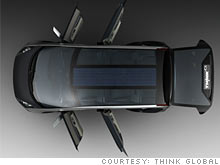The great battery race
Dramatic developments in stored-power technology make electric cars more
viable than ever.
By Alex Taylor III, senior editor

Think's lineup of battery-powered vehicles extends even to this sports
utility vehicle, unveiled this week.
(Fortune) -- At a breakfast in New York last week, Jim Press, vice chairman
and president of Chrysler LLC made the startling announcement that every
single new Chrysler, Dodge, and Jeep is being engineered so that it can be
adapted for a gas-electric hybrid powertrain. That's a huge change for
technologically challenged Chrysler, which currently markets only two
gas-electric hybrid vehicles - both of them equipped with technology
developed by General Motors (GM, Fortune 500).
In fact, Press's statement is the most sweeping endorsement of hybrid
vehicles by any manufacturer - Toyota included - and it represents a huge
reversal in attitude toward hybrids. Scorned as uneconomical curiosities
only a few years ago, they are now solidly in the mainstream. Whereas 13
hybrid models were for sale in 2007, there are, by one count, expected to be
more than 60 available by 2011. GM announced this week that it will offer at
least 16 hybrid models by 2012.
Aside from escalating gas prices and concerns about global warming, the
changing attitudes toward hybrids is being driven by rapid developments in
the batteries used to power them. Not long ago, batteries seemed trapped in
the 19th century, a mature technology that wasn't progressing very quickly.
But both established battery makers and ambitious startups are pushing
battery development at once unimaginable speeds.
Replacing nickel-metal hydride batteries, the kind that are used in the
Toyota Prius, are lithium-ion batteries, first designed for such
applications as laptop computers and cell phones. Lithium-ion batteries
provide twice the power, energy density, and cycle life of nickel
metal-hydride, but less than half the weight and size, and half the cost.
Last week Mercedes Benz claimed a major breakthrough, announcing it will use
lithium-ion batteries in its upcoming S-class hybrid, according to
Automotive News. Due to go on sale in Europe in mid-2009 and the United
States shortly thereafter, the vehicle, known as the S400 Bluetec Hybrid, is
said to produce nearly 300 horsepower along with fuel economy of nearly 30
miles per gallon. Mercedes' announcement is the first of a production model
hybrid by powered by lithium-ion. Mercedes' partner in the development of
the batteries is Johnson Controls (JCI, Fortune 500)-Saft, and the batteries
will be made in France and then assembled into modules.
Not to be outdone, GM said it will use lithium-ion batteries, developed by
Hitachi, in its next generation of hybrids, due to reach the market in 2012.
That's in addition to the lithium-ion batteries being developed by two other
suppliers, including A123 systems, for its Chevrolet Volt plug-in hybrid.
Other automakers are in the hunt. Nissan has set up a joint venture with
NEC, and Toyota is working with Matsushita. Another arrival to the
lithium-ion party is Ener1, based in Fort Lauderdale, which claims to make
the safest lithium-ion battery in the world because of its simple thermal
management system. It also may be the only one manufactured in the United
States.
Ener1 was one of more than a dozen companies screened by GM for its Volt
plug-in electric car but didn't make the cut. Since then, it has signed a
$70 million contract to provide batteries to Think Electric, a producer of
all-electric cars based in Norway.
You may recall that Think Electric was owned for a brief time by Ford Motor
Co (F, Fortune 500). during the Jacques Nasser era. Now it is independent
again, and has plans to market a tiny, two-seat electric car this year.
Instead of resembling a golf cart, the new version looks like the kind of
minicar that wealthy grandparents buy for their grandchildren. Think
believes that it can sell 10,000 of these vehicles over the next two years.
Those efforts got a boost today with the announcement that General Electric
(GE, Fortune 500) is investing in both Think and A123 systems (yes, the one
that's working with GM, too) to develop batteries for electric cars. Think
is thinking bigger: At the Geneva auto show it showed off a larger electric
vehicle - one that seats five people and is closer to the size of a sport
utility vehicle. Ener1 says that it and A123 systems will split the initial
orders for the small Think electric car.
Somehow, an electric sport utility vehicle seems like a step backward in the
fight against global warming. But it's another sign that high-performance
batteries are about to enter the mainstream.
© 2008 Cable News Network. A Time Warner Company ALL RIGHTS RESERVED To subscribe or visit go to: http://money.cnn.com/